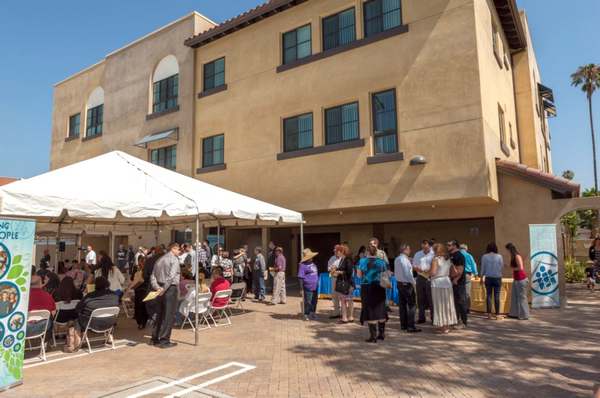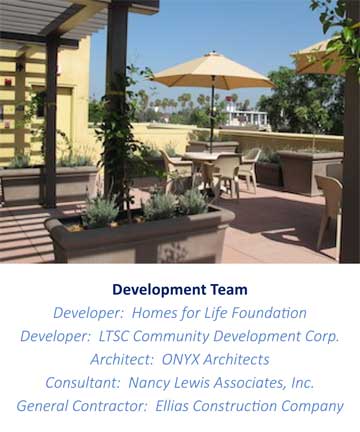Homes for Life Foundation | June 13, 2014
On June 13, 2014, the Homes for Life Foundation (HFLF) and Little Tokyo Service Center (LTSC) Community Development Corporation celebrated the grand opening of the HFLF Sequoia Apartments. HFLF Sequoia Apartments provide 24 housing units for low-income adults with mental disabilities, 12 of which are specifically set-aside for chronically homeless adults with mental disabilities. The lack of permanent, affordable, supportive housing has been one of the main obstacles to stabilized lives for mentally disabled adults. All units are affordable and range from 30% to 50% average median income.
Design of the HFLF Sequoia Apartments integrates the unique and various Mediterranean architectural styles found in the surrounding neighborhood. The development was constructed on a previously vacant lot, which had long been an eyesore in the community. HFLF Sequoia Apartments represents a high performing, energy efficient structure in the area and establishes a new precedent for what can be achieved in underserved communities in Los Angeles. The building was designed with many “green” elements and is targeting LEED Gold Certification. Some of the unique features include a permeable parking lot and bioswale, to help reduce and clean stormwater runoff, drought resistant landscaping, thermal solar water heating, recycling and LED lights throughout the building. Taking full advantage of the mild Southern California climate, two rooftop terraces provide a serene yet secure outdoor environment for residents with shade trellises and raised planter gardens around the perimeter.

In addition to providing quality housing, the development offers community and social service space to its residents. On-site supportive services include life skills development, mental health counseling, crisis intervention, economic empowerment through linkages to employment and education, and networking for off-site mental health services. A resident manager also lives on-site to assist residents capable of independent living.
HFLF Sequoia Apartments would not be possible without funding from the Department of Housing and Urban Development (HUD), California Tax Credit Allocation Committee, Los Angeles Homeless Services Authority, the National Equity Fund, and the Corporation for Supportive Housing. The HUD 811 program provided almost $4.1 million in funding, the National Equity Fund provided $4.8 million in tax credit equity investment, and the Los Angeles Homeless Services Authority provided over $500,000 in funding for capital and services.
“National Equity Fund is proud to partner with LTSC Community Development Corporation and Homes for Life Foundation to enable residents of the HFLF Sequoia Apartments to live independently in a safe and stable home with vital social services,” commented Todd Fabian, vice president and regional manager at National Equity Fund, Inc., the development’s source of LIHTC equity. “Its developments like Sequoia that make this industry so rewarding.”

Homes for Life Foundation was formed as a nonprofit housing and services agency in 1986, and is dedicated to establishing a network of permanent, affordable, supportive housing within the geographical boundaries of Los Angeles County for homeless and chronically homeless individuals who suffer from mental disabilities. The fundamental purpose of offering mentally disabled adults the choice of a ‘home for life’ is to prevent their downward spiral of despair and crises due to lack of the same.
LTSC Community Development Corporation is a non-profit community-based organization, which has been providing services for over 30 years to the greater Los Angeles community. Programs include senior services, assistance for victims of domestic violence, support groups, social services, child abuse and neglect outreach, emergency food and shelter assistance, affordable housing, youth programs and community economic development.



